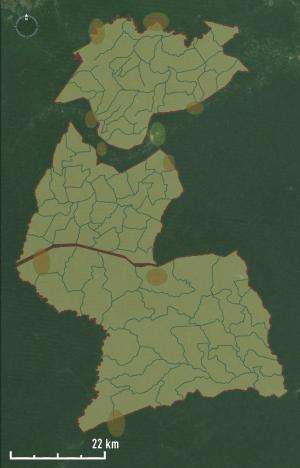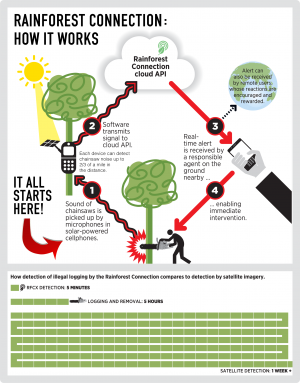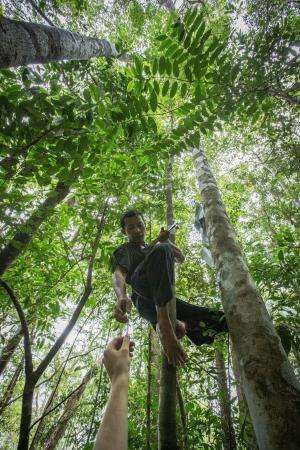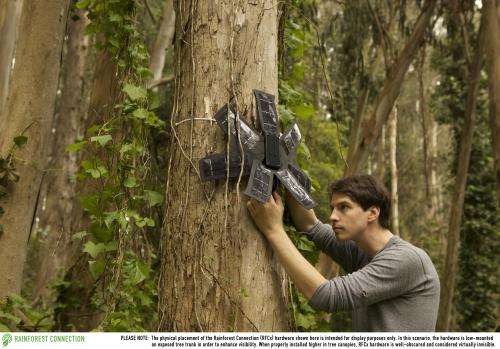Recycled smartphones to catch illegal loggers and poachers in africa

A new tool, built from recycled smartphones, is now set to make its debut on the front lines of the fight to protect some of Africa's most endangered rainforests.
Rainforest Connection (RFCx), a tech startup using "upcycled" mobile technology to monitor and protect remote forests in real-time, announced today that it has partnered with the Zoological Society of London (ZSL), a charity devoted to the worldwide conservation of animals and their habitats, to pilot new ways to monitor and stop illegal logging and animal poaching throughout the equatorial forests of Africa. A proposal by the two partners would install Rainforest Connection's anti-deforestation, anti-poaching technology in Cameroon this year.
RFCx has developed the first real-time detection system for deforestation and illegal logging using discarded Android smartphones to send alerts of rainforest destruction to first responders, giving them the ability to actually intervene. By contrast, current monitoring often relies on aerial surveys or satellite surveillance, which usually detect deforestation days or even weeks after the event.
The RFCx system was first successfully tested in 2013 against illegal loggers in Western Sumatra, Indonesia, proving the viability of the technology. Using highly-sensitive microphones, each autonomous, low-cost device can protect one square mile of rainforest, often home to over a thousand species of plants and animals. The devices, built to operate for years, employ a unique solar-panel design capable of generating sufficient electrical power within the predominantly shadowed tree canopy.

Chris Ransom, Programme Manager for ZSL in Africa, said: "We think this could be a critical new tool for protecting large areas of rainforest. We're excited to deploy it this year in collaboration with our local partners in Africa."
Randy Hayes, Founder of Rainforest Action Network, Executive Director of Foundation Earth and a thirty-year veteran of rainforest conservation efforts, said of RFCx technology, "This is the most exciting critical new tool that I've seen that I think can help us get the job done."
Topher White, RFCx founder, believes that all the right tools have come to fruition at just the right moment to make difference. "It's clear that real-time awareness and intervention is a major missing piece in protecting the world's last remaining rainforests. By using old smartphones and existing telecommunications infrastructure, we have built a system that we think could scale quickly enough to make a real impact."

The United Nations (UN) states that deforestation is a leading cause of climate change and global species extinction rates, which are 1000-times higher than normal, according to the journal Science. Deforestation is responsible for at least 17% of global carbon emissions, according to Interpol. Each Rainforest Connection device installed is equivalent to taking 3000 cars off the road in terms of carbon mitigations due to averted logging activities.

Dave Grenell, RFCx co-founder, said, "We are experiencing one of the highest rates of species extinction since the time of the dinosaurs. Future generations will look back on this as a kind of holocaust. Protecting endangered forests is one of the most important things we can do today to help."
Journal information: Science
Provided by Rainforest Connection


















